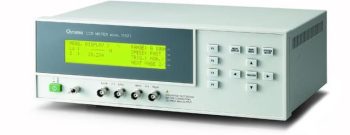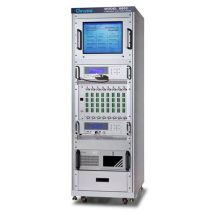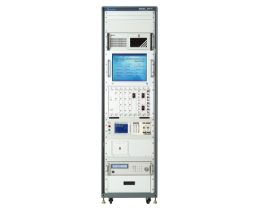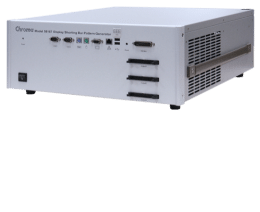Electrical Component Test Systems
Electrical Component Test Systems (ECTS) are specialized testing systems designed to evaluate the performance and functionality of various electrical components used in a wide range of industries, including aerospace, automotive, defense, telecommunications, and power generation. These systems typically include a range of testing equipment, such as test fixtures, electronic load banks, power supplies, oscilloscopes, and other specialized tools that can perform specific types of tests, such as voltage, current, resistance, and frequency measurements. They can also be used to simulate real-world operating conditions and environmental stresses, such as temperature, humidity, and vibration. Some of the most common types of electrical components that are tested using ECTS include resistors, capacitors, inductors, transformers, switches, relays, and integrated circuits. The tests are typically designed to evaluate various performance parameters, such as accuracy, stability, reliability, and durability. One of the primary advantages of using ECTS is that they can help to identify potential issues or defects in electrical components before they are installed in a final product. This can help to improve the overall quality and safety of the final product, as well as reduce the risk of costly recalls or product failures. Overall, Electrical Component Test Systems are a critical component of modern manufacturing and engineering processes, enabling engineers and technicians to ensure that electrical components meet rigorous performance standards and operate reliably under a wide range of operating conditions.
Electrical Component Test Systems (ECTS) are specialized testing systems designed to evaluate the performance and functionality of various electrical components used in a wide range of industries, including aerospace, automotive,…
...defense, telecommunications, and power generation.
These systems typically include a range of testing equipment, such as test fixtures, electronic load banks, power supplies, oscilloscopes, and other specialized tools that can perform specific types of tests, such as voltage, current, resistance, and frequency measurements. They can also be used to simulate real-world operating conditions and environmental stresses, such as temperature, humidity, and vibration.
Some of the most common types of electrical components that are tested using ECTS include resistors, capacitors, inductors, transformers, switches, relays, and integrated circuits. The tests are typically designed to evaluate various performance parameters, such as accuracy, stability, reliability, and durability.
One of the primary advantages of using ECTS is that they can help to identify potential issues or defects in electrical components before they are installed in a final product. This can help to improve the overall quality and safety of the final product, as well as reduce the risk of costly recalls or product failures.
Overall, Electrical Component Test Systems are a critical component of modern manufacturing and engineering processes, enabling engineers and technicians to ensure that electrical components meet rigorous performance standards and operate reliably under a wide range of operating conditions.
-
The Chroma 11021/11021-L LCR Meter is a cost-effective digital LCR Meter, providing 100Hz, 120Hz, 1kHz, and 10kHz test frequencies for the 11021 and...FIND OUT MORE
-
The Chroma 58154 series ESD Test System (Electrostatic Discharge) are PXI/PCI controlled modules to simulate electrostatic discharge pulses during...FIND OUT MORE
-
Chroma 8800 component automatic test system (ATS) is developed to effectively help manufacturers reduce test costs and product risks. The system is...FIND OUT MORE
-
FUNCTIONS Supports electrical safety tests and function test scanning : – AC/DC WV Test, – IR Test – GB Test, LC Test (all...FIND OUT MORE
-
The latest safety standards for medical equipment are very strict and because the medical equipment is in constant use by medical staff for patient...FIND OUT MORE
-
In the evolution of panel design, larger display and higher resolution will be the main-stream of future technology for panel manufacturers. LTPS TFT...FIND OUT MORE






